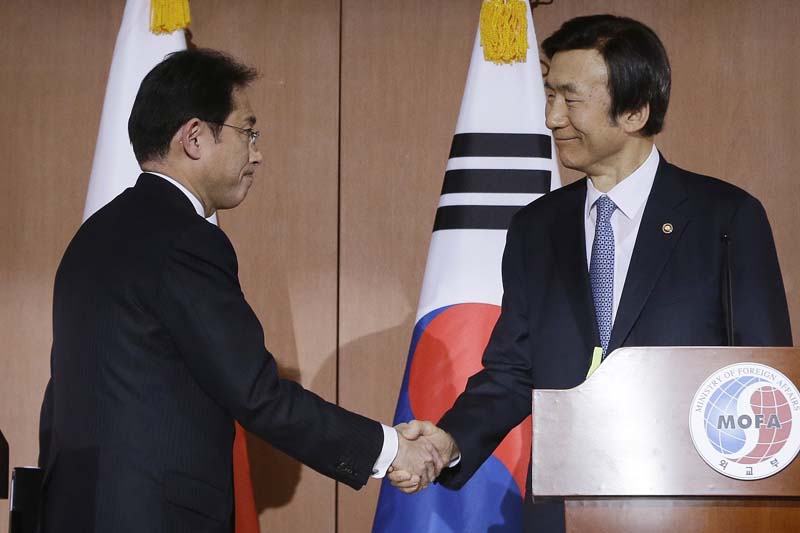S.Korea, Japan reach landmark deal on WWII sex slaves
SEOUL, SOUTH KOREA: An apology from Japan's prime minister and a pledge of more than $8 million sealed a breakthrough deal Monday on a decades-long impasse with South Korea over Korean women forced into Japanese military-run brothels during World War II.
The accord, which aims to resolve the emotional core of South Korea's grievances with its former colonial overlord, could begin to reverse decades of animosity and mistrust between the two thriving democracies, trade partners and staunch US allies. It represents a shift for Tokyo's conservative government and a new willingness to compromise from previously wary Seoul.
A joint statement from both countries' foreign ministers said Prime Minister Shinzo Abe "expresses anew his most sincere apologies and remorse to all the women who underwent immeasurable and painful experiences and suffered incurable physical and psychological wounds as comfort women," their euphemistic name.
It wasn't immediately clear if Abe would be issuing a separate written statement or if it would be directly delivered to the 46 surviving former Korean sex slaves, now in their 80s and 90s.
The language mirrored past expressions of remorse by other prime ministers, although it was seen by some in Seoul as an improvement on previous comments by the hawkish Abe government, which has been accused of whitewashing past wartime atrocities.
Another deciding factor was that the 1 billion yen ($8.3 million) came from the government, not private sources, something Tokyo has been reluctant to provide in the past.
South Korean Foreign Minister Yun Byung-se said Seoul considers the agreement "final and irreversible," as long as Japan faithfully follows through with its promises.
Later Monday, Abe called Park and reiterated his apology. He said Tokyo would implement the deal and called the issue settled irreversibly. Park said she hopes the two countries will build up mutual trust and open a new era in bilateral ties based on Monday's agreement, it said.
After phoning Park, Abe told reporters that the agreement was based on his commitment to stop younger generations from being obliged to apologise.
"Japan and South Korea are now entering into a new era," said Abe, adding that he did not want to "pass on the burden on our children, grandchildren and their offspring to keep apologising.... We should not drag this problem into the next generation."
Despite the soaring official rhetoric, the initial reaction of former sex slaves was mixed. One woman said she would follow the government's lead, while another vowed to ignore the accord because Tokyo didn't consider the money a formal compensation.
"Isn't it natural to make a legal compensation if they commit a crime?" said Lee Yong-su (88) according to South Korea's Yonhap news agency.
Some in Seoul saw the deal, while not perfect, as an important step forward.
"If we brushed aside this deal, the comfort women issue would remain unresolved forever," said Lee Won Deog, director of Institute of Japanese Studies at Seoul's Kookmin University. "Elderly women would die one by one; South Korea and Japan would engage in history wars and find it harder to improve ties."
Many South Koreans feel lingering bitterness over Japan's brutal colonial occupation of the Korean Peninsula from 1910-1945. But South Korean officials have also faced calls to improve ties with Japan, the world's No. 3 economy and a regional powerhouse, not least from US officials eager for a strong united front against a rising China and North Korea's pursuit of nuclear-armed missiles that could target the American mainland.
Japan appeared emboldened to make the overture to Seoul after the first formal leaders' meeting between the neighbors in 3 ½ years, in November, and after South Korean courts recently acquitted a Japanese reporter charged with defaming South Korea's president and refused to review a complaint by a South Korean seeking individual compensation for Japan's forceful mobilisation of workers during colonial days.
Seoul, meanwhile, will refrain from criticising Japan over the issue, and will talk with "relevant organisations" — a reference to civic groups representing the former sex slaves — to try to resolve Japan's grievance with a statue of a girl representing victims of Japanese sexual slavery that sits in front of the Japanese Embassy in downtown Seoul. Yun said South Korea recognises Japan's worries about security over the statue, where anti-Tokyo protests take place weekly.
There has long been resistance in South Korea to past Japanese apologies because many here wanted Japan to acknowledge that it has a legal responsibility for the women.
Foreign Minister Fumio Kishida later emphasised in a closed-door briefing with Japanese reporters that Tokyo doesn't consider the 1 billion yen as compensation, but "a project to relieve emotional scars and provide healing for the victims." It will include medical services, health checks and other support for the women, he said. All compensation was settled by a 1965 treaty that restored diplomatic ties and was accompanied by more than $800 million in economic aid and loans from Tokyo to Seoul, he said.
But Kishida said the comfort women system "deeply hurt the honor and dignity of many women under the involvement of the Japanese military at the time, and Japan strongly feels responsibility."
Historians say tens of thousands of women from around Asia, many of them Korean, were sent to front-line military brothels to provide sex to Japanese soldiers.
Better relations between South Korea and Japan are a priority for Washington. The two countries together host about 80,000 US troops and are members of now-stalled regional talks aimed at ending North Korea's nuclear ambitions in return for aid.






